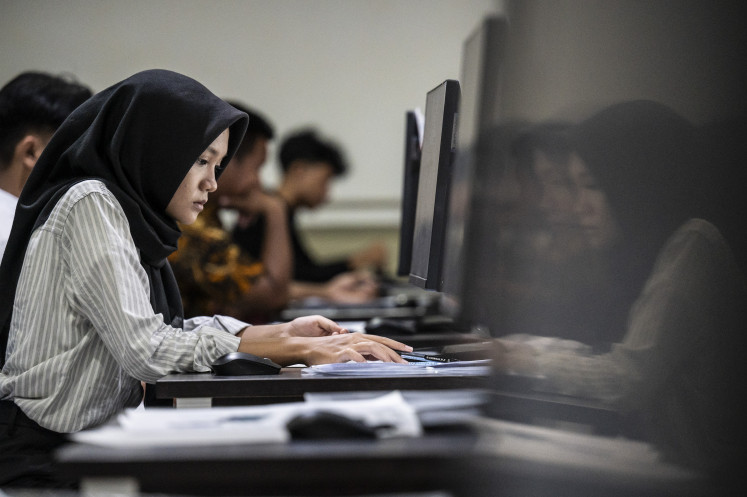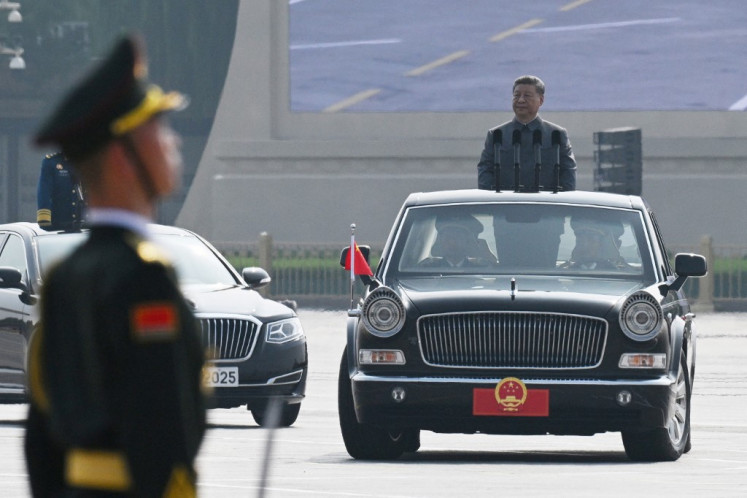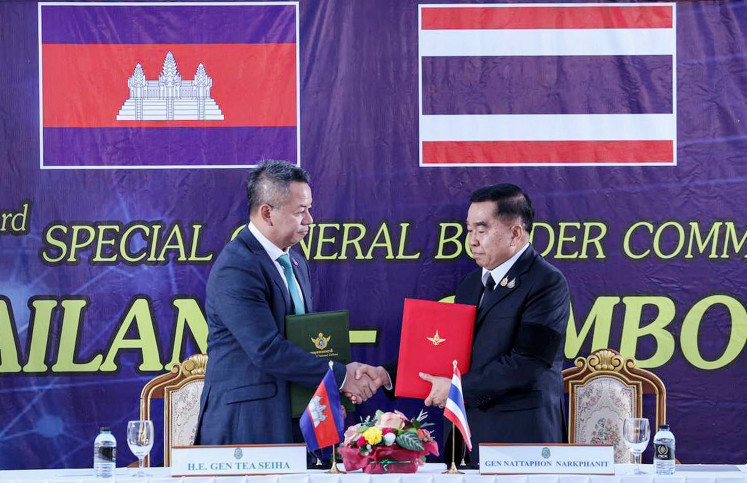Popular Reads
Top Results
Can't find what you're looking for?
View all search resultsPopular Reads
Top Results
Can't find what you're looking for?
View all search resultsFrom red to green menace: How 'radicalism' becomes the new political bogeyman in Indonesia
We the people should have known that the solution to this problem is not creating a big government to exert greater control on us and restrict our freedom, let alone launching a national campaign to purge the country of radicalism through repressive or other nondemocratic means.
Change text size
Gift Premium Articles
to Anyone
T
he Red Scare may not be entirely over in Indonesia more than 50 years after the 1965 anticommunist hysteria that led to the massacre of thousands if not millions of Indonesians. But the specter of communism is now overshadowed by the new political bogeyman in Indonesian politics: Islamic radicalism.
There is no question that the threat of religious extremism is real. We know its dangers, how it corrupts our youth — their hearts and minds — and how it is now slowly destroying the very fabric of society we have treasured for decades.
But we the people should have known that the solution to this problem is not creating a big government to exert greater control on us and restrict our freedom, let alone launching a national campaign to purge the country of radicalism through repressive or other nondemocratic means.
We had a similar problem before, and we know for a fact how badly it ended.
President Joko “Jokowi” Widodo, who has struggled against an Islamist opposition ever since he set foot in the capital to become the nation’s most popular and most divisive president of all time, has made it his mission to combat radicalism after winning a second term on April 17.
For Jokowi, radicalism is more than just a political enemy.
He is aware of its perils, with dozens of terror attacks and major incidents of intolerance happening under his watch. That is why the President has included radicalism, along with stunting and poverty, on the list of things he wants to eradicate.
To achieve his mission, he appointed Tito Karnavian, a former police chief who holds a PhD in terrorism and once led the nation’s counterterrorism squad, as home affairs minister. Jokowi, like Soeharto many years ago, also gave the religious affairs minister post to Fachrul Razi, a former military general known for his brash, no-nonsense attitude toward anything related to Islamic radicalism.
The first target of the antiradicalism drive is the civil service.
Fachrul and Tito have done more than just stepping up their rhetoric against religious radicalism; both have initiated new policies to keep the civil service away from political ideologies other than the state ideology Pancasila.
Both ministers are among the signatories of a joint ministerial decree to purge the civil service of radical ideologies. The decree, signed by 11 ministries and state body heads, bans civil servants from expressing an opinion on social media that contains “hate speech” against Pancasila, the 1945 Constitution, the state motto of Bhinneka Tunggal Ika (Unity in Diversity), the Unitary State of the Republic of Indonesia (NKRI) or the government. It also says civil servants could face sanctions for liking tweets that contain such hate speech, or for attending events that promulgate hate speech.
A website has been set up to allow the public to report civil servants espousing radical ideas.
The joint decree is an extreme measure to fight extremism. It is no less controversial than Fachrul’s proposed antiradicalism policy, such as banning female civil servants from donning the niqab and their male counterparts from wearing their pants above the ankle in government offices.
While the government claims that their war on radicalism is not politically motivated or aimed at a certain religion, the policies seem to indicate otherwise.
Antiradicalism policies that focus too much on regulating what people can or cannot write on social media or wear in their offices are a product of the fallacy that Islamic radicalism can easily be reduced to stereotypes.
The truth is that radicalism is more than just what people wear or say. Like other religions, Islam is not immune to schism, having dozens if not hundreds of denominations. The faith is professed by over a billion people with different ways of approaching its scriptures, from which they seek spiritual guidance.
The devil is always in the details: How can the government determine whether one’s beliefs are radical or not? Does being critical of the government make a civil servant radical? Should any Muslim who believes that a caliphate is a legitimate form of government be considered radical? Is there wiggle room for anyone to conduct a healthy argument about what, exactly, a caliphate is?
Indonesia is now seeing the rise of the Salafi movement, a trend that has alarmed Nahdlatul Ulama, the defenders of traditional Islam, or Islam Nusantara as they would call it. But even Salafism has many branches, many of which are apolitical and nonviolent. Hence, it is wrong to label a person a radical for choosing a lifestyle associated with Salafism, such as wearing cropped pants.
The government must act against any form of violent ideologies, including those associated with Islamic radicalism. But the war on radicalism must follow democratic principles to ensure it serves its ultimate purpose: to protect the rights of all Indonesian people.
The current rhetoric and policies shown by government officials look more like propaganda and a witch hunt than a carefully designed policy to educate the people about the values of the four pillars of the nation — Pancasila, the Constitution, the Bhinneka Tunggal Ika and the NKRI — and why we need them.
President Jokowi has already used the war on radicalism as a political talking point during his campaign. His ardent supporters have even portrayed him as the only savior that can protect Indonesia from radical Islamic groups, which they call kadrun (desert lizards) on social media. Coupled with this type of propaganda, Jokowi’s war on radicalism looks nothing but sinister.
We cannot afford to bear the consequence of engaging in political propaganda and political witch hunt to ward off a political bogeyman. We learned that the hard way in 1965. When fears of communism gripped the nation, we became suspicious not only of our enemies, but also friends, colleagues and neighbors.
People were killed then, but the bogeyman is still alive and well.










